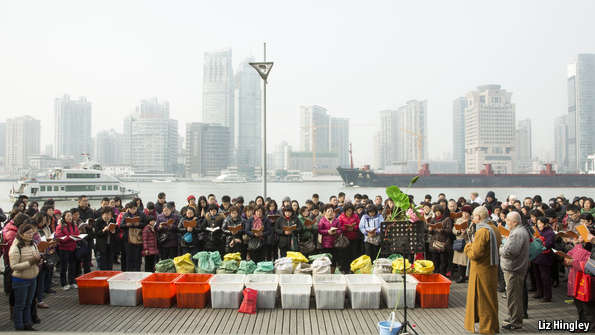动物精神【经济学人】
A religious revival
Animal spirits
Releasing animals into the wild is in vogue—with unwelcome consequences
Sep 12th 2015 | SHANGHAI | From the print edition
来源:Economist
翻译:Z.K.

The Huangpu: hardly loach heaven
黄埔江:几乎成了泥鳅的天堂
EVERY Saturday morning hundreds of devotees gather by Shanghai’s Huangpu river to liberate fish. Over three hours some 2,000 loach are tipped into the murky waters to the sound of chants.
每个星期六早晨,数百名信徒聚集在上海黄埔江边,伴随着颂歌声,在三个多小时内,2000多条泥鳅被倒进黄浦江浑浊的江水中。
This is fang sheng, or “animal release”, an East Asian Buddhist ritual in which captive creatures are freed. The point is to demonstrate compassion and earn merit. The practice is ancient, though along with everything else, it was condemned as so much superstition under Mao Zedong. Today fang sheng is making a comeback, especially among the young and well-off. Officials estimate around 200m fish, snakes, turtles, birds and even ants are released each year—though no one really has a clue.
这叫“放生”,或者说“释放动物”,是东亚佛教的一种仪式,即把圈养的动物放到野外。目的是为了表示同情,积累功德。这是一种古老的做法,但是与别的东西一样被xxx认为是封建迷信。现在,放生的习俗卷土重来,尤其在年轻人和富人中特别流行。虽然没有具体的统计数据,但是根据官方估计,每年大概有2亿鱼,蛇,乌龟,鸟甚至是蚂蚁被放生。
Fang sheng associations can rake in around 1m yuan ($157,000) in annual donations. For some monks it has become a racket. The greatest price, however, is paid by the animals themselves and the ecosystems from which they come and into which they go.
组织放生的协会每年可以赚取大概1百万美元。对于某些僧侣来说,这已经变成一种产业。然而,付出最大代价的还是那些动物们还有他们的生态系统。
A vast and mainly illegal wildlife trade caters to the demand for animals. Figures are hard to come by, but one paper estimated that in Hong Kong two markets sold over 630,000 birds a year, most destined for fang sheng. Many animals—perhaps half of all the birds—die during capture or transit from stress, disease or mishandling.
庞大的而且大部分非法的动物交易造成了对动物的大量需求。具体数据很难得到,但是根据一篇文章的估计,香港市场每年出售超过6.3万只鸟,大部分运往放生的目的地。许多动物(也许有一半)在被捕和运输的途中死于压力,疾病或者处理不当。
Nor does using reared or exotic species help. They create havoc in local ecosystems. Zhou Zhuocheng, chairman of China’s main body on aquatic ecology, cites the case of the mosquito fish from North America, a popular fish for fang sheng. It feeds on the eggs of the native Japanese rice fish, causing the latter to disappear completely in some areas. To add to the grimness, many animals, once released, are hoovered up and sold again to fresh devotees. Animals that do not survive the trauma are often sold as food.
除了外地运过来的物种和饲养的物种之外,他们还在当地的生态系统搞破坏。Zhou Zhuocheng是中国水生生态主体的主席,他提到一种来自北美的食蚊鱼,是一种流行的放生鱼类。它滋生于日本稻鱼的卵,导致后者在某些领域完全消失。更为严重的是,有许多动物,一被放生,马上又被抓了回来,再卖给新的放生者。动物身上的创伤导致他们没法生存,最后被当成食物出售了。
Wang Tianbao, a 26-year-old programmer and evangelical Buddhist, admits that paying for animals that have only recently been released is “a waste of money”. Yet still he is prepared to spend oodles on fang sheng, through whose associations he can disseminate Buddhist information and reach new followers. He says he first practised fang sheng as a student, releasing two turtles that cost him 98 yuan, his food budget for three weeks. Today he spends 5,000-7,000 yuan, or about 5% of his annual salary. There may just be better ways to earn merit.
wangtianbao今年26岁,是一个程序员,同时也是福音派佛教徒。他承认为那些最近被放生的动物买单,完全是“浪费金钱”。但是他依然在放生上花费大量金钱,通过他们的协会,他可以传播佛教教义,并吸收新的追随者。他说,他第一次放生的时候还是一名学生,当时他花了98元放生了两只斑鸠,这是他三个星期的生活费。现在,他每年花费5000到7000元在放生上,这是他年收入的5%。除了放生,应该有更好的方式获得功德。



